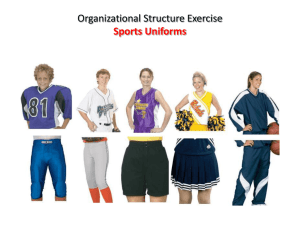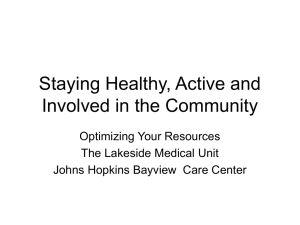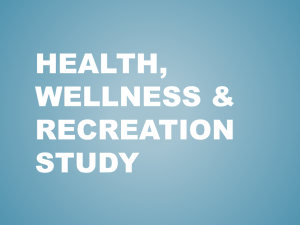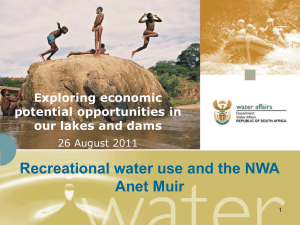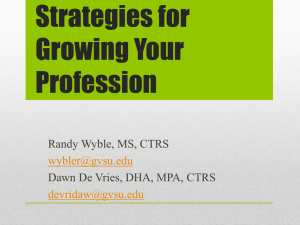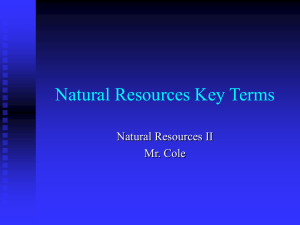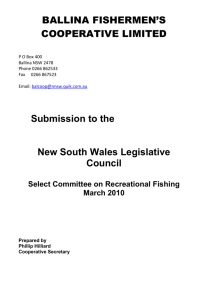Welcome to the 2nd Annual Judith E. Voelkl Memorial Recreational
advertisement
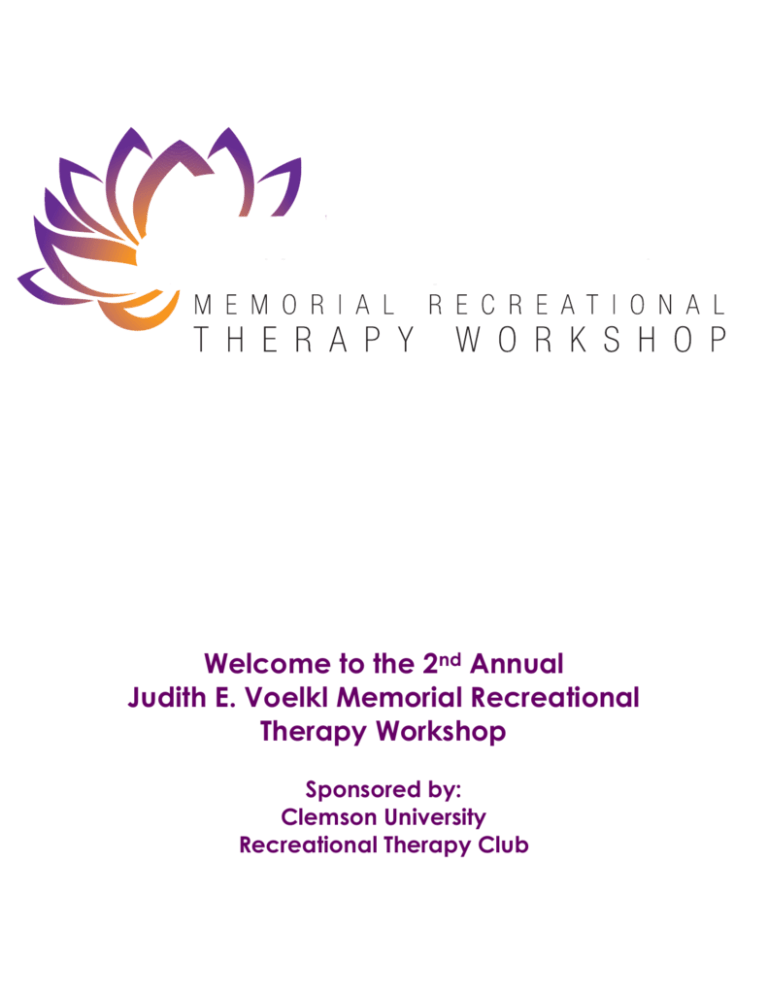
Welcome to the 2nd Annual Judith E. Voelkl Memorial Recreational Therapy Workshop Sponsored by: Clemson University Recreational Therapy Club 2nd Annual Judith E. Voelkl Memorial Recreational Therapy Workshop March 02, 2015 Clemson University 730-830 AM Registration and check in Light continental breakfast will be available. 830-900 AM Welcome: Dr. Marieke Van Puymbroeck, Ph.D., CTRS, FDRT and Dr. Fran McGuire, Ph.D. Raffle Information: Ms. Brenna Goodwin and Dr. Joy James, Ph.D. 900 -1000 AM Ballroom 1 & 2 “Understanding the History of Recreational Therapy and Charting a Better Future: A Personal Perspective of 40 Years of Leadership” Dr. Peg Connolly, Ph.D., LRT/CTRS, FDRT Session Description: Recreational therapy has a rich history of challenges and advances. Dr. Connolly has contributed over 40 years of service to the profession and will share her personal perspectives on what we have accomplished and what we still need to improve. Some of the significant advances have been in our national certification program and our standards of practice. However, we continue to lag behind in other areas such as the quality and intensity of our educational programs and our lack of professional involvement. The purpose of this keynote will be to examine our history, challenge ourselves to improve critical areas that will determine our future. Participants will be challenged to engage and promote the advancement of our profession. Learning Outcomes: 1. Participants will describe at least two significant historical events that have shaped the advancement of RT as a profession. 2. Participants will describe at least three challenges, which continue to limit our professionalism and professional growth as an occupation. 3. Participants will describe at least three actions we can individually take to advance the profession of RT. 1015-1115 AM Ballroom 1 “Theory into Practice: The Reformulated Health Protection/Health Promotion Model in Recreational Therapy” Dr. David Austin, Ph. D., FDRT, FALS Session Description: The developer of the Reformulated Health Protection/Health Promotion Model will present his conceptual model, the relationships of theory to practice, and implications for the model to practice in recreational therapy. Learning Outcomes: 1. Indicate how theory relates to practice in recreational therapy. 2. State the mission or goal of recreational therapy according to the Reformulated Health Protection/Health Promotion Model. 3. List the three types of interventions used in recreational therapy according to the Reformulated Health Protection/Health Promotion Model. Ballroom 2 “The Need for Higher Education in Recreational Therapy” Dr. Brandi Crowe, Ph.D, LRT/CTRS; Dr. Brent Hawkins, Ph.D., LRT/CTRS; Dr. Marieke Van Puymbroeck, Ph.D., CTRS, FDRT Session Description: Have you considered graduate school? Do you need help weighing the pros and cons of pursuing a masters or doctoral degree? This session can help you with your decision! This session will facilitate discussion on the need and opportunities for graduate education in Recreational Therapy. We will address the need for graduate education at the masters and doctoral level, cover different types of graduate education, share experiences with graduate school, inform you of current graduate opportunities, weigh the benefits and challenges to pursuing a graduate degree, and how to navigate graduate school from application to graduation and beyond. Learning Outcomes: 1. Identify at least 3 benefits to graduate education in Recreational Therapy. 2. Discuss at least 3 challenges to graduate education in Recreational Therapy. 3. Identify at least 2 accessible opportunities for graduate education in Recreational Therapy via online or in-person programs. 4. Discuss at least 3 practices that will help to successfully navigate the graduate school process. 1115-1145 AM LUNCH (provided) 1145 – 1245 PM (WHOLE GROUP) Ballroom 1 & 2 “Contemporary Issues in Recreational Therapy Practice: Treatment Networks” Brent Hawkins, Ph.D., LRT/CTRS, Marieke Van Puymbroeck, Ph.D., CTRS, FDRT; Brenna Goodwin; Brandi Crowe, Ph.D., LRT/CTRS Session Description: This session will break clinicians and students in to areas of practice and will allow each group to exchange contact information and discuss concerns/trends within that area of practice. Each group will have the opportunity to develop an action plan for the coming year. Learning outcomes: 1. 2. 3. Individuals will be able to verbally identify 3 other clinicians/students who work or have an interest in their particular area of practice. Individuals will be able to verbally identify at least 2 concerns facing Recreational Therapists in their particular area of practice. Individuals will verbally identify 2 contemporary issues facing Recreational Therapists in their particular area of practice. 100 - 200 PM Ballroom 1 “The Role of High and Low Rope Elements on Self-Efficacy” Jesy Cordle Session Description: The purpose of this study was to determine the outcomes related to utilizing high ropes courses as a treatment intervention on self-efficacy for the general population. Lack of consistency in terminology throughout research makes application at a practitioner level more difficult, and this study addresses one type of course within adventure based therapy. This purpose of this session is to describe the results of the mixed methods study, as well as to discuss the application of similar programming in different recreational therapy programs for individuals with disabilities. This information can then be used for practitioner implementation and for future research addressing the specific needs of individuals with various disabilities. Learning Outcomes: 1. Participants will be able to identify at least three differences in types of ropes courses and course terminology. 2. Participants will be able to determine the impact of high ropes challenge courses on generalized self-efficacy, as it relates to this study. 3. Participants will be able to identify the potential benefit of high or low ropes courses specific to their profession and program. Ballroom 2 “Leisure Participation and Perceived Constraints of Parents and Caregivers of Children with Disabilities” Kayla Kiernozek and Dr. Angela Wozencroft, Ph.D., CTRS Session Description: During this session, participants will gain a better understanding of the perceived leisure constraints of parents/caregivers of a child with disabilities and, how, when given the opportunity for respite from parenting roles, they use their leisure time. Through the lens of the constraints model framework developed by Crawford and Godbey (1987) and Crawford, Jackson, and Godbey (1991), the perceptions of barriers to leisure of parents/caregivers of a child with disabilities will be examined in connection with leisure participation during a time of respite. The presented study will identify parents/caregivers perceived constraints (intrapersonal, interpersonal, and structural). Also, parent/caregiver leisure participation will be compared when they are responsible for providing care to their child versus their time during a respite opportunity. Information from this study will help professionals in the field of therapeutic recreation become more aware of the need of developing, creating, and providing more respite opportunities for parents/caregivers of children with disabilities. Learning Outcomes: 1. Participants will become more aware of the need for more respite opportunities in the field of therapeutic recreation by identifying at least three examples of perceived leisure constraints of parents/caregivers with a child with disabilities. 2. Participants will be able to identify at least two of the most commonly used coping strategies of parents/caregivers of a child with disabilities. 3. Participants will be able to identify three different types of leisure activities parents/caregivers take advantage of during a time of respite. 200 -215 PM Snacks- located outside Ballrooms 1 & 2 215 -315 PM Ballroom 1 “Navigating Group Therapy” Shelley Danser, CTRS; Ethan Jordan, CTRS; Jeffrey Brannan Session Description: While training to become recreational therapists, we spend little time learning about the dynamics of group therapy although it is very prominent within our field. Group therapy is a form of psychotherapy in which professionals and peers provide support and education for one another. Group therapy provides opportunity for clients to practice and employ skills important to symptom management. Group therapy also increases connection and group rapport by offering a safe space for processing and peer guided education. The role of the recreational therapist is to provide tangible discussion material and to set appropriate margins in group discussions. The recreational therapist is also responsible to provide feedback to the group in order to make the material tangible and applicable to one’s treatment and overall health and wellness. Although group therapy breaks the mold from individual sessions, it provides a refreshing approach to psychoedcuation and treatment in the mental health domain. Learning Outcome: 1. Participants will be able to define group therapy as well as identify 3 curricula used within the mental health population. 2. Participants will be able to verbalize 3 different styles of group leadership and the importance of continuity, safety, structure, and confidentiality. 3. Group members will successfully identify the importance of creating a supportive group environment that promotes skill usage and group vulnerability. Ballroom 2 “Brain Injury Rehabilitation: Case Study” Marguerite Davis, CTRS Session Description: Brain Injury is a diagnostic group often seen in rehabilitation hospitals. Assessment and treatment by Recreational Therapy can be very challenging and variable with this population. Experiencing the process, one patient at a time, helps with growth and confidence in your RT skills. This session will follow one patient from admission to discharge from Roger C. Peace Rehabilitation Hospital looking at the overall interdisciplinary plan of care with emphasis in Recreational Therapy. Learning Outcomes: 1. Describe the 3 main areas of assessment and treatment for brain injury. 2. Describe the basic rehab process and outcome of a person with brain injury. 3. Define three treatment methods used in Recreational Therapy when working with patients with brain injury. 330 – 430 PM Ballroom 1 “Recreation Therapy as Part of the Interdisciplinary Treatment Team Approach in Physical Medicine and Rehabilitation” Angie Pihera, CTRS Session description: Discuss the vital role Recreation Therapists play as a part of the interdisciplinary treatment team in Physical Medicine and Rehab. Working along-side Physical, Occupational, and Speech therapists benefits not only the patients but also the treatment team members. Benefits of recreation therapists being involved in treatment team meetings, functional co-treats, and team groups/outings will be discussed. Learning outcomes: 1. Upon successful completion of this session, each participant will identify and describe the role of the Recreation Therapist on the interdisciplinary treatment team. 2. Upon successful completion of the session, each participant will identify and describe 2 ways to implement co-treats and/or group sessions. 3. Upon successful completion of this session, each participant will identify and describe 3 ways in which you can improve your recreation therapy treatment sessions by involving other disciplines. Ballroom 2 “Supervision of Recreational Therapy Internships: CARTE Standards and Expectations for Quality” Dr. Peg Connolly, Ph.D., LRT/CTRS, FDRT Session Description: CARTE Accreditation Standards and Guidelines require provide guidance for educational programs and clinical instructors (supervisors) of recreational therapy student internships on quality expectations for internships. The purpose of this session is to provide an overview of the standards for clinical instructors, education sites, education experiences, internship experiences and proficiencies, clinical supervision, and the responsibilities and qualifications of a clinical instructor. This includes the roles, qualifications, and expectations of clinical supervisors for recreational therapy internships. It also will cover student knowledge and skills prior to the clinical internship placement, purpose and nature of clinical education, and a brief overview of teaching/learning styles of supervisors and students. Discussion will center on supervisory past experiences as well as expectations for quality internships. Learning Outcomes: 1. To verbally identify at least 3 responsibilities and qualifications of a clinical instructor. 2. To verbally describe 2 skills expected of a student intern from a Recreational Therapy Program prior to placement in a recreational therapy internship. 3. To verbally define 3 learning styles that may influence the clinical instructor/student relationship. Interested in a graduate degree from Clemson University in recreational therapy? Our graduate program is taking off, and we’d love to have you to join us! Contact Marieke Van Puymbroeck, Ph.D., CTRS, FDRT, Recreational Therapy Coordinator at mvp@clemson.edu or 864-656-1189. NOTES ________________________________________________________________________ ________________________________________________________________________ ________________________________________________________________________ ________________________________________________________________________ ________________________________________________________________________ ________________________________________________________________________ ________________________________________________________________________ ________________________________________________________________________ ________________________________________________________________________ ________________________________________________________________________ ________________________________________________________________________ ________________________________________________________________________ ________________________________________________________________________ ________________________________________________________________________ ________________________________________________________________________ ________________________________________________________________________ ________________________________________________________________________ ________________________________________________________________________ ________________________________________________________________________ ________________________________________________________________________ ________________________________________________________________________ ________________________________________________________________________ ________________________________________________________________________
![[Share-My-Toys Membership] Marketing Plan](http://s2.studylib.net/store/data/005475303_1-5c5fcecf250fc9c92c1a18cc8f242409-300x300.png)
